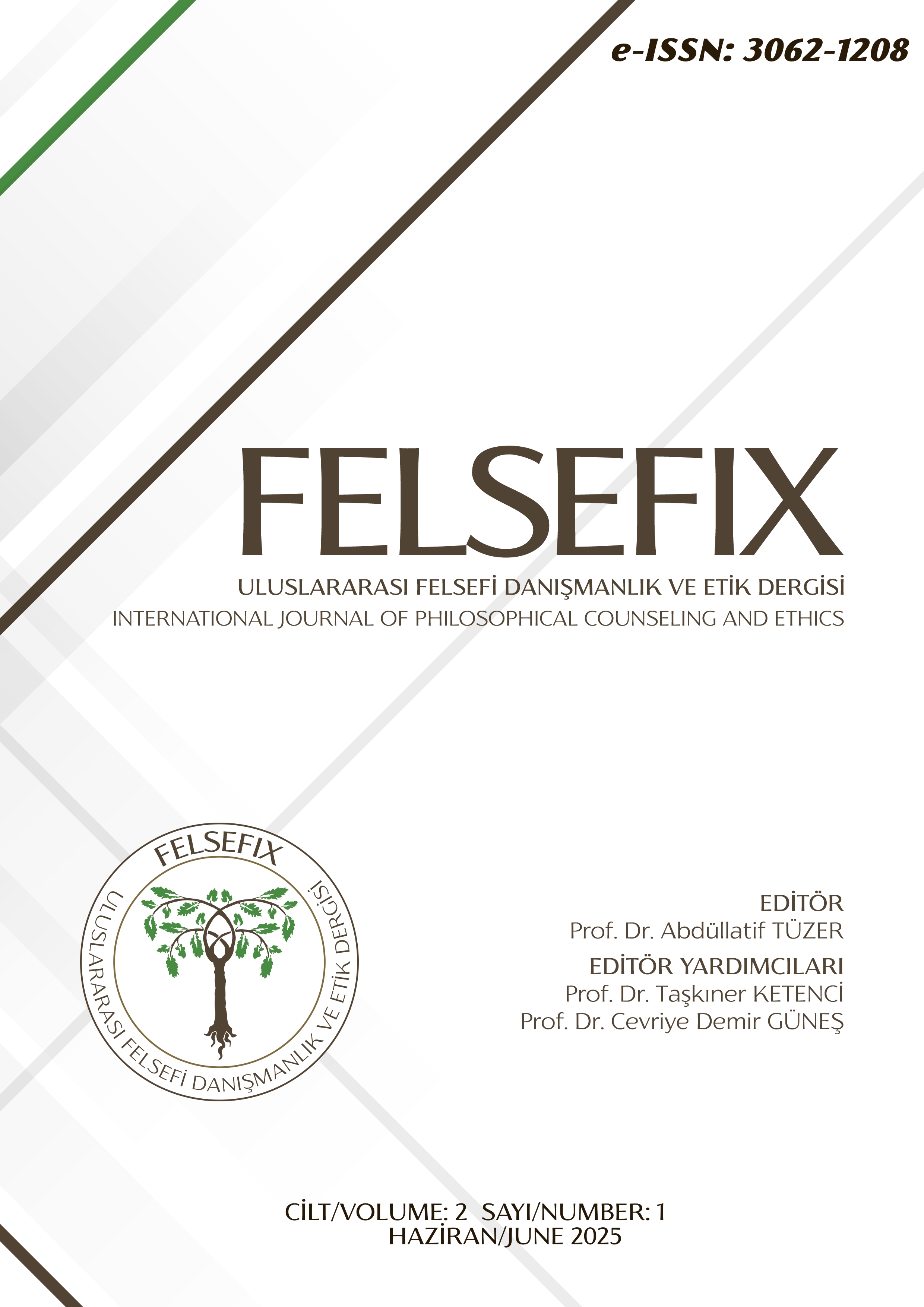Author :
Abstract
Bu makalede Ayn Rand’ın Objektivizm adını verdiği anlayışın temelinde yatan felsefe anlayışı ele alınmıştır. Rand, Objektivizm’i akla, mantığa ve insan tabiatının gereklerine dayandırarak temellendirir. Objektivizm; ontolojiden epistemolojiye, etikten politika ve estetiğe uzanan bütünlüklü bir düşünce sistemidir. Rand Objektivizm felsefesini şekillendirirken sık sık felsefeye olan ihtiyacımızdan söz etmiş, felsefenin birey ve toplum açısından taşıdığı önemi her ortamda dile getirmiş objektivizm anlayışını da bu bilinçle ortaya koymuştur. Rand bireyin hiçbir şeyin kendisine hazır verilmediği bir dünyada, aktif bir akılla ve eleştirel bir bakış açısıyla niçin ve nasıl sorularına cevap arama gayreti içinde olması gerektiğini vurgular. Bu doğrultuda eleştirel düşünme becerisinin kazanılmasının felsefi araştırma bağlamındaki öneminden söz eder. Rand’a göre, bireylerin bazı felsefelerin akla ve değerlere saldırdığını anlayabilmeleri, akıllarını ve değerlerini koruyabilmeleri için yine felsefenin kazandırdığı bilgiye ihtiyaç vardır. Aynı şekilde uluslar da bu bilgi ve bilinçle hareket etmelidir. Çünkü ulusların kendilerine rehber edindikleri düşünce yapısı onları her alanda etkileyebilmektedir. Örneğin idealist bir felsefenin hâkim olduğu bir toplumda akıl ön plandadır ve insan bir araç değil amaçtır. Marksist felsefenin benimsendiği bir toplumda öncelik toplum yararıdır. Pragmatizmi benimseyen bir toplumda ise gerek etik gerekse politika alanında yarar ilkesine göre hareket edildiği görülür. Dolayısıyla Rand’ın özellikle aklın kılavuzluğuna yaptığı vurgunun dışında, birey ve toplumların benimsedikleri felsefenin onların geleceği üzerindeki etkisini dile getirmesi insanlık tarihinde de örneklerine rastladığımız yerinde ve haklı saptamalardır. Felsefi bakış açısı ve akımların kitlelere eğitim yoluyla çoğu zaman sistematik olarak verildiğini göz önüne alırsak eğitimin felsefi düşüncenin uygulama alanı olduğu gerçeğini kavrayabiliriz. Eğitim felsefesi oluştururken bu durumlar göz önünde bulundurulmalıdır. Bu doğrultuda hedeflerin nasıl, neye göre, hangi ölçüde uygulanacağı tercih edilen felsefenin türüne göre belirlenir. Rand, felsefenin bireyler ve toplum üzerindeki etkisi göz önüne alındığında, benimsenecek felsefenin altında yatan ilkelerin analiz edilmesinin önemini vurgular. Bu noktada Rand, aldatıcı felsefi teorilere, şüpheye veya belirsizliğe yol açmayan sağlam bir temele dayanan ilkeleri arar. Rand, sistemin dayandığı temelin tutarlı olmasının diğer unsurların da tutarlı olacağı anlamına geleceği düşüncesiyle incelediği konunun indirgenemez bir gerçekliğe sahip olup olmadığını test eder. Birçok felsefi tartışmanın tutarsızlık, dildeki çok anlamlılık, belirsizlik ve genellemelerden ortaya çıktığı düşünüldüğünde Rand’ın bu konudaki hassasiyeti haklı görünmektedir. Sonuç olarak Rand felsefenin, kendisine kazandırdığı bilginin temel unsurlarını şu şekilde sıralar: Algıladığımız dünya gerçektir, her şey olduğu gibidir (özdeşlik kanunu), akıl bilgi elde etmenin tek yoludur ve mantık ise aklı kullanmanın yoludur. Bu esaslar doğrultusunda yanlış düşünceler terk edilmelidir. Rand’ın tespitleri doğrultusunda yanlış düşüncelere zemin hazırlayan nedenler şu şekilde özetlenebilir: Test etmeden indirgenemez gerçekler kabul etmek, doğruyu ve realiteyi yok sayan nesnelliği ortadan kaldırmayı amaçlayan felsefi sloganlar benimsemek, kelimelere açık anlamlar yüklememek, iç hâlimizin kavramsal tanımlamasına dair dürüst bir içe bakış yapmamak ve türlü bahanelerle gerçeği çarpıtmak.
Keywords
Abstract
This article examines Ayn Rand’s philosophical attitude, which underlies the understanding she calls Objectivism. Rand bases Objectivism on reason, logic, and the needs of human nature. Objectivism is a holistic thought system that extends from ontology to epistemology, from ethics to politics and aesthetics. While shaping her objectivist philosophy, Rand frequently mentioned our need for philosophy, expressed its importance for individuals and society in every context, and presented her understanding of objectivism with this awareness. Rand emphasizes that in a world where nothing is given to individuals ready-made, one should strive to find answers to the questions of why and how with an active mind and a critical perspective. In line with this, she highlights the importance of acquiring critical thinking skills in a philosophical research context. According to Rand, individuals need the knowledge provided by philosophy to understand that some philosophies attack reason and values, and to protect their reason and values. Similarly, nations should act with this knowledge and consciousness because the mindset that nations adopt as their guide can affect them in every field. For example, in a society where an idealist philosophy prevails, reason is at the forefront, and people are not a tool but a purpose. In a society that embraces Marxist philosophy, the priority is the benefit of the society. In a society adopting pragmatism, it can be observed that the principle of benefit is followed both in ethics and politics. Therefore, in addition to Rand's em hasis on the guidance of rasyon, her expression of Theo impact of the philosophy adopted by individuals and societies on their future is a timely and justified observation that has historical examples. If we consider that philosophical perspectives and movements are often systematically conveyed to the masses through education, we can appreciate that education is the field of application of philosophical thought. These situations should be taken into account when creating an educational philosophy. In this context, how, according to what, and to what extent the targets will be implemented should be determined by the type of philosophy preferred. Rand emphasizes the importance of analyzing the principles underlying the philosophy to be adopted, given the impact of philosophy on individuals and society. At this point, Rand seeks principles rooted in a solid foundation that do not lead to deceptive philosophical theories, doubt, or uncertainty. Rand tests whether the subject matter she is examining has an irreducible reality, based on the idea that if the system's foundation is consistent, then the other elements must also be consistent. Considering that many philosophical discussions arise from inconsistency, polysemy in language, uncertainty, and generalizations, Rand's sensitivity to this issue seems justified. As a result, Rand lists the basic elements of the knowledge that philosophy gave her: The world we perceive is real, everything is as it is (law of identity), reason is the only way to gain knowledge, and logic is the means to use reason. In line with these principles, wrong thoughts should be abandoned. Based on Rand's findings, the reasons that pave the way for wrong thoughts can be summarized as follows: Accepting irreducible truths without testing them, adopting philosophical slogans that aim to eliminate objectivity, ignoring truth and reality, not attributing clear meanings to words, failing to take an honest look into the conceptual definition of our inner state, and distorting the truth with various excuses





